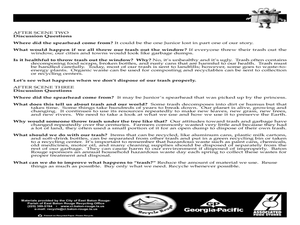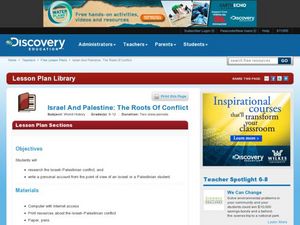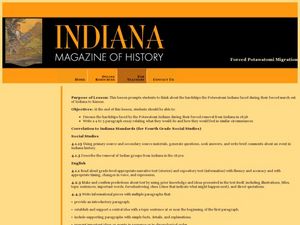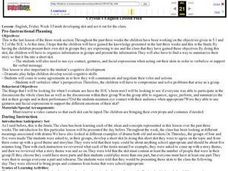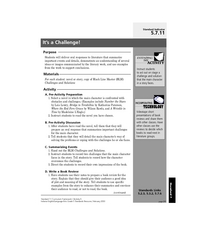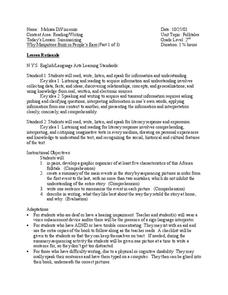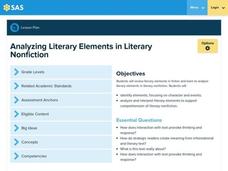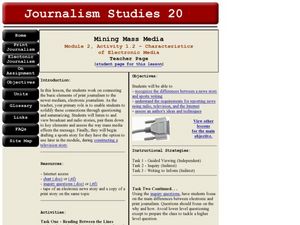Curated OER
Freak the Mighty, Chapter 2
In this literature response worksheet, students complete all or some of the 6 comprehension activities related to Chapter 2 of Freak the Mighty.
Curated OER
Fitting Trash into Yesterday: A Fifth Grade Activity
Fifth graders explore the concept of waste management. In this recycling lesson, 5th graders discover the history of waste management and discuss how the U.S. should respond to the issue of ever-increasing waste.
Curated OER
General Greene to General Marion: Your State is Invaded, Your All is at Stake
Third graders examine the contributions of Francis Marion and Nathaneal Greene. In this Revolutionary War lesson, 3rd graders use primary and secondary sources to research Marion and Greene and the accomplishments of their men during the...
Curated OER
What price Freedom! Civil War and Reconstruction
Fifth graders become familiar with the events of Reconstruction and the 13th, 14th, and 15th amendments. In this reconstruction lesson plan, 5th graders work in pairs where each student creates a building with blocks and draws it. Their...
Curated OER
Child Labor in the Carolinas
Fifth graders explore child labor and how children were exploited and used in the work place. In this Industrial Revolution lesson plan, 5th graders research child labor by reading, looking at photographs and drawing conclusions then...
Curated OER
Ancient History Cyber-Journalists
Students explore the ancient past. In this ancient civilizations lesson, students research ancient events and write newspaper articles about the events. Students work in teams of 4 to produce group newspapers that feature their findings....
Curated OER
The Alamo
Students study the Battle of the Alamo in depth. In this research skills lesson, students visit the Alamo de Parras website to examine issues related to the battle that took place in 1836. Students analyze comment strands on issues in...
Curated OER
Israel and Palestine: The Roots of Conflict
Learners examine the causes of the Israeli-Palestinian conflict. In this world conflict lesson, students research print and Internet sources about the roots of the conflict and the status of the conflict today. Learners use their...
Curated OER
Forced Potawatomi Migration
Fourth graders write about the forced Potawatomi migration. In this primary source lesson students are read journal entries from an emigrating party of Potawatomi Indians. Students reflect on the items the Indians might have taken with...
Curated OER
Celebrating Thanksgiving in the Classroom
A Thanksgiving themed project can be a fun and educational way to celebrate the holiday season.
Curated OER
iPod Reporters
Students develop a topic for a class newspaper article and set up an interview with someone involved in the issue. They record the interview using an iPod with a voice recorder then use direct quotes for their article. As a whole...
Curated OER
Drama Unit Skit
Learners, in groups, as a culmination of a unit on drama, develop a skit that reviews the concepts taught throughout the unit. They agree on the topic and come up with a good theme and storyline. After rehearsals, they perform the skit...
Curated OER
Railroads in Virginia
Young scholars decscribe the importance of railroads, new industries, and the growth of cities to Virginia's economic development. They locate on a map the small towns and cities that grew because of the railroads and create a flow chart...
Curated OER
Hindu Gods Batik
Learners identify the major Hindu gods and describe the relationship between them. They examine symbols and determine their meanings. They create a batik of a Hindu god of their choice and research them.
Curated OER
Mercy to the Rescue! Maze Activity
In this maze worksheet, learners complete a maze, helping "Mercy find some sugar cookies." Students draw a route from one house to another to complete the activity.
Curated OER
It's A Challenge!
Students write a book review stating challenges the character faced and if they enjoyed the book. In this language arts lesson plan, students fill out a worksheet provided.
Curated OER
Fantastic Facts
Fourth graders are introduced to expository texts. They dwell to formulate the comprehension and gain the main ideas. Students encounter explicit comprehension strategies to help them transition into this new type of text.
Curated OER
Stone Fox Plot Frame
Fifth graders recall the major plot points of a chapter book. After reading the chapter book "Stone Fox," they students describe the plot framework through use of a worksheet. Students are then divided into group to act out selected...
Curated OER
Why Mosquitoes Buzz in People's Ears
Second graders study folktales and their characteristics. After brainstorming what they know about Africa, 2nd graders read a book about mosquitoes. In groups, students develop a graphic organizer about the characteristics of the...
Curated OER
Families of Mount Olympus
Sixth graders explore Greek mythology. In this Greek mythology lesson, 6th graders research selected Internet sources on Greek gods and goddesses. Student use their research findings to create mythology family tress. Students also read...
Pennsylvania Department of Education
Analyzing Literary Elements in Literary Nonfiction
Fourth graders identify the literary elements of a nonfiction text. In this literary elements lesson, 4th graders read the text Piano Starts Here--The Young Art Tatum and fill in a chart that includes the events from the book....
Curated OER
Robert Smalls: Warrior and Peacemaker
Students research the events that led to the Civil War and the Reconstruction. In this Civil War history lesson, students study images of Robert Smalls and research his role in the Civil War. Students review the South Carolina...
Curated OER
"The Minister's Black Veil"
High schoolers participate in a layered curriculum unit for a novel. The novel study allows for a variety of activities for assessment and differentiation. The difficulty of the assignments is chosen by the student.
Curated OER
Mining Mass Media
Students take a closer look at the attributes of electronic media. In this journalism lesson plan, students compare and contrast electronic and print versions of the same news stories. Students then write their one broadcast news stories.



